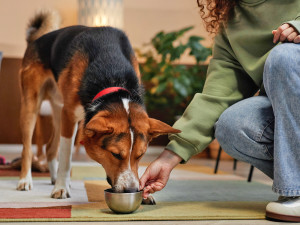
Share Article
What Kind of Milk Can Puppies Drink? Are All Dogs Lactose Intolerant? Is Milk Bad for Dogs? The Risks of Feeding Milk to Puppies Dairy Alternatives for Puppies Frequently Asked Questions
Puppies should drink their mother’s milk. Cow’s milk and other dairy products are not recommended for puppies or adult dogs. Many dogs are lactose intolerant, which means that feeding them milk can lead to digestive upset, potentially causing health issues.
What kind of milk can puppies drink?
Puppies nurse from their mothers almost exclusively for the first three to four weeks of life. This milk provides complete nutrition as well as antibodies for temporary immunity. Puppy nutritional needs include high levels of protein, fat, calcium, docosahexaenoic acid (DHA), and other essential vitamins and minerals. Luckily, maternal milk has the right amount of essential nutrients to meet those demands.
But what kind of milk can puppies drink when maternal milk is not available? Can puppies drink regular milk? These questions can come up in situations when mom rejects the puppies, is too sick for them to nurse, or has passed away. Fortunately, there are options for orphan pups.

What type of milk can orphaned puppies drink?
The two best options for abandoned puppies are finding a surrogate mother or bottle-feeding a commercial puppy milk replacement formula. Using a surrogate dog has the benefit of easily providing the puppy with complete nutrition, nursing care, and some social learning.
Commercial puppy milk formula has the benefit of mimicking canine milk in nutrient ratios, providing complete nutrition. The puppy caretaker can also measure and ensure that the puppy is getting enough milk and adjust meal sizes as the puppy grows. Either option, a surrogate mother or commercial puppy milk formula, can provide adequate nutrition until it’s time to start the weaning process.
Can puppies drink cow milk?
Puppies should not be fed cow milk. Cow milk is lower in protein, fat, and essential minerals than canine milk, meaning it will not provide adequate nutrition for a puppy. Cow milk is also higher in lactose, a milk sugar than many dogs cannot process effectively. Feeding cow milk to a puppy can lead to malnutrition and gastrointestinal upset.
Can puppies drink goat’s milk?
Like cow milk, goat milk falls short when it comes to providing the level of protein and fat puppies need. Goat milk has slightly lower amounts of lactose than cow’s milk, but still enough to cause gastrointestinal upset.
Goat milk, both raw and processed, is a commonly recommended milk substitute for bottle-feeding puppies. The hype around goat milk is that It is readily available (in processed form) and highly digestible. But this digestibility applies to people, not puppies. Raw goat milk has not been pasteurized, meaning it has not undergone the process of being heated to kill bacteria. Feeding a puppy raw goat milk runs the risk of them ingesting harmful bacteria like E.coli, Salmonella, or Listeria.
Are all dogs lactose intolerant?
It’s not known what percentage of dogs are lactose intolerant, but many dogs seem to be. Lactose is a sugar found in milk and many dairy products. Lactose intolerance occurs when the body does not produce enough lactase — an enzyme found in the intestines that breaks down lactose. Like people, dogs can produce lower levels of lactase as they age.
It’s usually not hard to tell if your dog is lactose intolerant. Many dogs can tolerate small servings of dairy products like cheese and yogurt, but cannot tolerate milk. Some dogs will develop bubble guts if they have any dairy at all. Signs of lactose intolerance in dogs include:
Gas
Bloating
Abdominal discomfort
Vomiting
Is milk bad for dogs? The risks of feeding milk to puppies
Many well-meaning people who take in foster puppies wonder if puppies can drink regular milk, but the answer is no. “Regular” milk doesn't have all the nutrients that puppies need. Puppies who do not have appropriate nutrition during this phase of rapid growth and development are at risk for having health issues. Nutritional deficiencies can lead to slow weight gain, poor organ development, stunted bone growth, and ongoing digestive issues.
Hopefully it’s clear that regular milk is not ideal for puppies, but is milk okay for dogs? Some adult dogs can tolerate milk just fine when offered in moderation, but it really does not provide much nutritional benefit. Dogs that are consistently fed milk run the risk of developing digestive issues or weight gain.
Dairy alternatives for puppies
Plant-based milks like oat, soy, rice, and almond milk are popular dairy alternatives. Non-dairy milk can be safe for dogs in small amounts, but they’re not recommended for puppies and cannot support a puppy’s nutritional requirements.
Dog parents must also check the full ingredient list of these products before offering them to a dog. Many non-dairy milk products have added sugars or artificial sweeteners like xylitol, which can cause low blood sugar and liver injury in dogs. Some non-dairy milks contain other dangerous additives like macadamia nuts, which can cause lethargy, weakness, and muscle tremors.
FAQs (People also ask):
Can dogs eat yogurt?
Dogs that are not lactose intolerant can eat yogurt in moderation. Dogs should only be offered plain or Greek yogurt that is unsweetened (no sugar or artificial sweeteners like xylitol), unflavored, and is without any additives.
What can dogs drink besides water?
Water is essential for life and is by far the best liquid for dogs to drink. When offering a liquid treat or encouraging a dog to drink, dog parents can offer diluted, low-sodium beef, chicken, or bone broth.
What kind of milk can abandoned puppies drink?
Abandoned or orphan puppies should be bottle-fed commercial puppy milk replacement formula or be placed with a surrogate dog that is willing to let the puppy nurse. Puppies should not be fed cow, goat, or non-dairy milk.
References:
Is Raw Goat Milk Healthy? Here’s What the Science Saysopens in new tab
Food Intolerances - ACVIM 2017 Proceedings

Dr. Alycia Washington, DVM, MS
Alycia Washington is a small-animal emergency veterinarian with over 10 years of experience based in North Carolina. She works as a relief veterinarianopens in new tab and provides services to numerous emergency and specialty hospitals. She also works as a veterinary writer with a focus on educating pet parents.
Related articles
![Golden retriever puppy upside down playing with a mans hands and attempting to play bite.]()
How to Train a Puppy Not to Bite
Those little razor teeth are no fun.
When Can a Puppy Leave Their Mom?
Of course, you’re their parent, too. But they need their biological mom for as long as possible.
Can Puppies Eat Adult Dog Food?
They might want to hurry up and be a big kid, but here’s why it’s good to wait.
Can Adult Dogs Eat Puppy Food?
They might still be your baby, but here’s why they need to eat like a grown-up.
What Is the Best Puppy Food for Small Breeds?
They may be tiny, but their appetites are not.
![Border Collie puppy shaking owner's hand]()
When to Start Training a Puppy: a Complete Puppy Training Schedule By Age
Your puppy training schedule, from eight weeks to six months. Let’s do this.
![Close Up Of Female Owner Feeding Border Terrier Puppy With Dry Dog Food At Home.]()
The Ultimate Guide to Your New Dog’s Nutrition
From kibble to homemade food, these tips will help you learn the fundamentals of dog nutrition.










